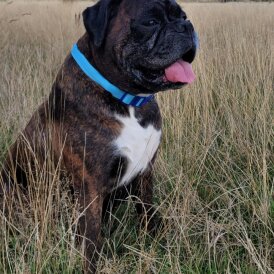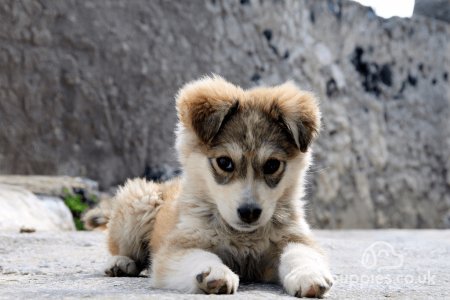Why Boxers are great
As loyal as they are handsome and clever, Boxers make great guard dogs and family pets. They are energetic, playful dogs who appreciate regular exercise and are known for being great with children. They are an expressive, comical breed, and would be right at home in a bustling household. Some highlights:
In the past, Boxers were bred to be medium-sized guard dogs, and their loyal, fearless nature means they live up to this role.
With their patience and sweetness, they get along well with children of all ages.
Their playful, humorous nature means there will never be a dull moment!
Their short coat is very easy to groom.
Things to consider when looking at Boxers for Sale
As with any breed, there are some important things to consider before buying your boxer puppy. Some downsides to the Boxer:
Boxers are prone to worry when left alone for too long, and may in some circumstances engage in destructive behaviour.
Boxers are incredibly sensitive to hot weather, so precautions must be taken to ensure they do not overheat.
Boxers may be more susceptible than other breeds to some health issues, such as heart defects.
History of Boxers
Boxers are descended from the now-extinct German Bullenbeiser. Bullenbiessers were developed in 19th century Germany as bull baiting dogs, and were later used by butchers and farmers to guard their cattle. Boxers as we know them now came about later in the same century when a man named George Alt bred a female Bullenbeisser with another dog of unknown origin. Boxers were enlisted as messenger dogs during World War I and II, used for carrying packs and guard duties. They became popular worldwide in the 1940s, when soldiers brought them back from the war as pets.
Appearance
Boxers are medium-sized, graceful dogs with a distinctive square jawline, naturally floppy ears and a muscular build.
How big is the Boxer?
Male Boxers measure between 57 and 63cm, and females between 53 and 59 cm at the withers.
How heavy is a Boxer?
A typical male would weigh between 30 and 32kg, and a female between 25 and 27kg.
What Colour is the Boxer?
Boxers come in one of two colours: fawn (light brown) or brindle (light base colour with darker streaks). They may also have white flashing or a black mask.
Temperament
Boxers are playful, rambunctious dogs who retain their puppy-like nature into adulthood. They are warm, loving and energetic, and can always be relied upon to greet you enthusiastically when you come home! They are also extremely family friendly, and would thrive in a busy family environment where they have lots of contact with people.
Do Boxers make good guard dogs?
Boxers make excellent guard dogs. They were originally bred for this role, and they have a strong physique, a loyal temperament, and will approach threats fearlessly.
Do Boxers bark a lot?
Boxers have a low tendency to bark, but may sound off if they sense a threat approaching.
Are Boxers easy to train?
Boxers are reasonably easy to train, but respond best to methods of positive rather than negative affirmation. They would benefit from a lot of early training and socialisation to ensure that they are well-behaved and comfortable around other dogs and people, so enrolling them in puppy training may be a good idea.
Are Boxers playful?
Boxers are very playful and lively dogs. They have a humorous temperament which would fit in well with a large, busy family. Be warned, though, their spirited personalities do sometimes have an independent streak, and they may misbehave if treated harshly!
Are Boxers good with children?
Boxers are known for being excellent with children — they are patient, sweet and protective. Owners should be aware, however, that their playful nature and stocky build means they should be carefully supervised around toddlers, as they may accidentally knock them over when playing.
 Are Boxers good with other pets?
Are Boxers good with other pets?
Most Boxers get along very well with other pets, particularly if they are raised with them.
Can I leave a Boxer Alone?
Boxers should not be left alone for long periods of time, as they are prone to anxiety and may become destructive. This breed would be well suited to a large family home which is consistently occupied.
Health
Though they are on the whole a healthy breed, there are some conditions which Boxers may be more susceptible to than other breeds. In particular, owners of White Boxers should be aware that they may be prone to deafness and cancerous growths.
How long do Boxers live?
As with many larger breeds, Boxers do not have a lengthy life expectancy, and can be expected to live between 7 and 10 years.
How much exercise does a Boxer need?
Boxers are energetic, sporty dogs who require regular exercise to avoid them becoming bored. Around 40 minutes or more a day would be sufficient.
What are Boxers Common health issues?
Boxers are more prone to cancerous growths than other breeds, especially those with white markings, so owners should be careful to apply sun cream to these areas when taking their dog outside in the summer months. They are also susceptible to inherited heart problems, such as aortic stenosis (AS) and Boxer cardiomyopathy. These conditions are difficult to detect, so may cause an unexpected death. They are also prone to hip dysplasia, gastric dilation, allergies and deafness (especially white Boxers).
Care
How much space do I need for a Boxer?
Because of their energetic, rambunctious nature, a Boxer would do well in a large, busy household with a large garden. Though they are not outdoor dogs, they would likely feel cooped up in a smaller house or apartment, and may engage in destructive behaviour.
What should I feed my Boxer?
Ideally a Boxer should be fed a formula for an active, medium sized breed. They would benefit from a regular feeding schedule of two meals a day — as with most breeds, they may become overweight if overfed. Owners of this breed may ask their vet for specific feeding recommendations, as they may vary amongst individual dogs.
How much grooming do Boxers need?
Boxers are a short-coated breed, which means that they shed minimally and are very easy to groom.
Average costs
How much does it cost to keep a Boxer?
As a rough guide in pricing: Cost to buy: roughly £800-£1500 for a well-bred Boxer puppy Other costs (Vet, Food etc): £10 per month for veterinary insurance, £40 for food
Specific Buying Guide
You can read our general buying guide here (/advice-on-buying-a-puppy/), with the most important thing being going to view your Boxer Puppy, seeing it with its mother, and checking the quality of the breeder. More specifically, here is some Boxer puppy buying advice:
As there are a multitude of genetic conditions which a Boxer may inherit, ensure that the breeder has done every possible health check before purchasing.
Other reading, Adopting Boxer Puppies and Rescue Organisations
A big thank you to the following sources who helped to shape this article: https://www.hcbw.org.uk/ https://www.boxerdogrescue.co.uk/ https://www.thekennelclub.org.uk/search/breeds-a-to-z/breeds/working/boxer/ https://dogtime.com/dog-breeds/boxer#/slide/1 https://www.hillspet.com/dog-care/dog-breeds/boxer https://www.akc.org/dog-breeds/boxer/












 Are Boxers good with other pets?
Are Boxers good with other pets?







